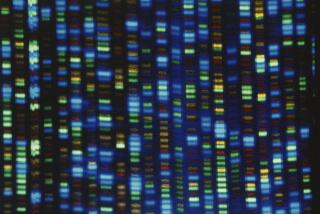Entire genome of fetus sequenced without DNA from man
How long will it be before prenatal care involves sequencing the genome of a fetus to detect genetic disorders before birth? Several recent reports have shown it can be done, based on the tiny bits of DNA that float around in the mother-to-beâs blood plasma during pregnancy.
Another such study came out this week in the journal Nature -- with some important advances.
In the past, fetal-genome analyses have involved getting samples of DNA from three places: the womanâs blood cells (to identify her genome), the womanâs blood plasma (to detect fetal DNA in addition to her own) and cells from the father-to-beâs saliva (to know for sure what bits of his DNA the fetus inherited).
But sampling the manâs DNA is a âparticularly delicate issue,â the study authors note, since âthe incidence of non-paternity is estimated to be between 3% and 10%.â
In the new study, senior author Stephen R. Quake and colleagues at Stanford University did the entire analysis without sampling the manâs DNA.
As reported before, the authors were able to infer which bits of the womanâs genome had been picked up by the fetus since those DNA regions were present in the plasma in extra amounts. But they could also accurately deduce the father-to-beâs genome by identifying bits of genome that did not come from the woman.
Paternity issues aside, the authors note that âthere are substantial ethical issues associated with noninvasive prenatal genetic determination, which we have not attempted to address. We will note however that there are numerous clinical scenarios where this approach would be useful.â
If the test is done early -- in the first or second trimester -- it could detect genetic conditions that are not survivable or will cause medical complications, they write. With medical advances, it might be possible to treat or even cure these conditions while the baby is still growing inside the woman.
Tests done in the third trimester could help reveal before birth if a fetus has inherited a serious disorder that can respond well to timely treatment. That could prevent harm or suffering, the authors say. Diseases they mention include phenylketonurea and maple syrup urine disease. In both cases, the disorder affects metabolism of certain amino acids and a special diet is needed to avoid harm to brain and body.
One of the pregnant women in the study was carrying a fetus with a genetic disorder known as DiGeorge syndrome. Caused by a deletion on Chromosome 22, the syndrome is characterized by an array of medical problems including heart defects, cleft palate and low blood calcium. âIn this clinical scenario, confirmation of the deletion would argue for a fetal echocardiogram and neonatal assessment of calcium levels,â the authors write.
Quakeâs lab earlier showed plasma DNA could be used to identify a missing chromosome in a fetus, such as in cases of Down syndrome. Such tests are already on the market. But the latest work can scan for a whole array of potential defects, including ones caused by single DNA nucleotide changes.
-- For the Booster Shots blog






